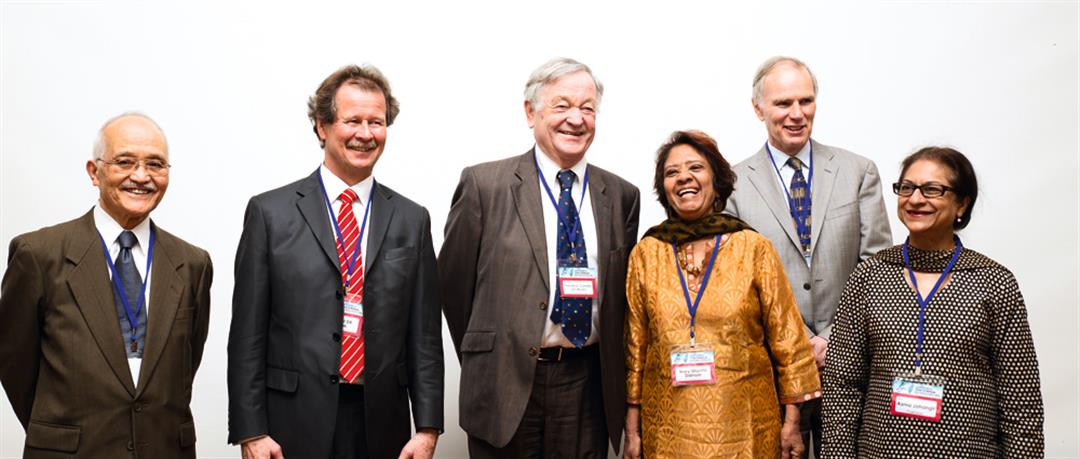International Experts Complete Review of Taiwan’s First National Human Rights Report
Eric Lin / tr. by Max Barker
April 2013

At the end of February 2013, 10 international human rights experts, invited by the Ministry of Justice, completed their review of Taiwan’s first national human rights report. The experts made 82 constructive recommendations with respect to the current state and future development of human rights in Taiwan.
Ideally, Taiwan would have wanted to have its human rights report—which the government produced to conform to international norms set by the International Covenant on Civil and Political Rights and the International Covenant on Economic, Social, and Cultural Rights—reviewed by the United Nations. But since Taiwan has been blocked from entering the UN, the government decided instead to invite these foreign experts to come to Taiwan to do their own review. Interestingly, because Taiwan permitted the participation of more than 50 Taiwanese non-governmental organizations in its process, it can be seen as a possible precedent that the UN could learn from to improve the way it reviews human rights reports from other countries.
Frederic Laplanche, head of the European Economic and Trade Office in Taipei, said in a formal statement that these steps by Taiwan constitute an extremely positive development. There is, he added, room for improvement in the democratic systems and protection of human rights in both the European Union and Taiwan. In particular, the EU hopes that in future Taiwan will make progress on the issue of abolition of the death penalty.
On February 25, 10 international human rights experts invited to Taiwan met with government officials for a three-day closed-door conference at the Civil Service Development Institute in Taipei City, to review the country’s national human rights report.
On March 1, the experts held their own press conference to release their observations and recommendations. They stated up front that they were very impressed by many aspects of Taiwan’s human rights situation—the many courses offered on the subject in universities, the growing consciousness of rights among citizens, and the government’s efforts to attain international human rights standards in the country’s laws and institutions—while recognizing that Taiwan has done all this despite being excluded from international forums that are promoting the global trend toward greater protection of human rights.
There was also praise for the review process itself. Philip G. Alston, a professor at the New York University School of Law and co-chair of the law school’s Center for Human Rights and Global Justice, noted that when the UN assesses human rights reports submitted by countries, it normally does so in Geneva or New York, and the experts involved do not get a chance to see the situation in the country first-hand, nor do they have the opportunity to interact with local NGOs. In contrast, this review of Taiwan’s report was conducted in-country and the government arranged for NGOs to present formal briefings to the experts and engage in dialogue with them, setting an important precedent not only for Taiwan but for the entire international community.

One of the many topics addressed by the experts was gender equality. They expressed the hope that Taiwan could eliminate all forms of discrimination based on sexual orientation or identity, especially in schools and the workplace. This photo was taken at the 2012 LGBT parade.
However, while the international experts had a mostly positive view of Taiwan’s human rights situation, they still produced 82 recommendations, which came as something of a shock.
Of these, the four that drew the most attention in Taiwan were probably those related to the establishment of a national human rights commission, placing a moratorium on use of the death penalty, eliminating discrimination based on sexual orientation or identity, and upholding housing rights.
(1) The experts recommended that Taiwan should, outside of the existing constitutional structure, create—in conformity with the Paris Principles—a national human rights commission that could independently exercise its duties. The Paris Principles, which are the standards adopted by the UN in 1993 for its own member states, encourage all countries to establish national-level human rights institutions to ensure that international human rights standards are met.
(2) The experts identified the death penalty as the most prominent human rights issue in Taiwan at the present time.
Last December, before coming to Taiwan, some of the invited experts called on Taiwan to place an immediate moratorium on the application of the death penalty. This sparked a reaction among some commentators in Taiwan that they were “interfering in Taiwan’s internal affairs.”
Following the review process, the experts remained adamant. Noting that there is a clear trend in the international community toward abolition, they called on the government to intensify its efforts to eradicate capital punishment and, “as a first and decisive step, immediately introduce a moratorium on executions in accordance with the respective resolutions of the UN General Assembly.”
(3) The human rights experts also paid considerable attention to issues related to gender equality, sexual orientation, and sexual identity.
The experts took note of “reports that transgender persons are widely considered to suffer from a form of mental illness and that persons with gender identities different from their biological sex suffer many forms of discrimination, including bullying in schools.” The Ministry of Education should, they said, “develop appropriate educational materials with a view to addressing homophobic biases that affect students’ perceptions of gender identities other than their own.”
As for society beyond the campus, the experts expressed concern that LGBTI (lesbian, gay, bisexual, transgender, and intersex) persons routinely suffer discrimination in society at large, leading to high suicide rates and both physical and psychological health problems.
They recommended that all healthcare personnel and teachers at all levels of education “be trained regularly on the full respect of human rights of LGBTI persons.” They also suggested that more could be done to draw media attention to these issues, and advised that public information campaigns be developed for the mass media.
(4) Do you remember the debate in Taiwanese society over “housing justice” and “housing rights” back in 2012, following the forced relocation of people from decrepit buildings to make way for “urban renewal” in Taipei City? The experts also devoted attention to this issue area.
The experts noted “with concern” that there are “hundreds of families living in informal settlements in Taipei, who are presently threatened with forced evictions without adequate alternative housing as required by international human rights standards.” They also drew attention to the forced evictions conducted in connection with construction of the A7 station of the Airport Mass Rapid Transit line, in which tenants had land sold out from under them to construction companies without any meaningful consultation process, affecting 5000 persons in 700 households.
The experts suggested that the central government (a) review and amend the Urban Renewal Act, and (b) provide alternative housing to evicted persons so that citizens will not end up homeless.
Now it’s time for actionMany domestic NGOs expressed satisfaction with the results of the conference for review of the national human rights report, and praised the government for its efforts. It was said that “the format of the conference was definitely more progressive than that used by the UN.” However, many also warned that the main thing now is to see whether or not Taiwan actually implements the suggestions made by the experts.
Lin Hsinyi, director of the Taiwan Alliance to End the Death Penalty, states: “Just as the experts noted, although Taiwan has passed the two international human rights covenants into domestic law, they have rarely been invoked by judges in actual court decisions.” She says that for the future, the government should adopt a more pro-active human rights action plan and set aside a budget for its implementation, while government officials and civil servants at all levels should be reeducated so they will be acutely sensitive to international trends in human rights. Only then will the country truly be in step with the most advanced standards in the world.




@List.jpg?w=522&h=410&mode=crop&format=webp&quality=80)


